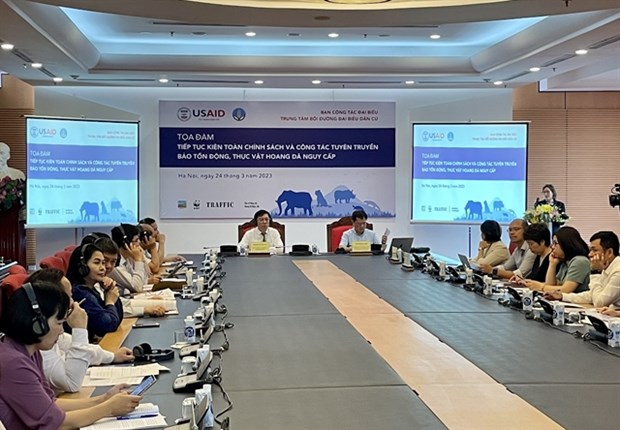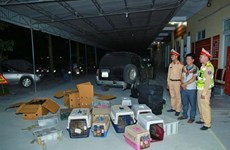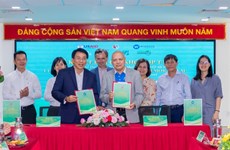Dialogue discusses wildlife conservation efforts
Improving policy and communication strategies on wildlife protection and management was the main theme of a high-level policy dialogue taking place in Hanoi last week.
 Delegates attend a high-level policy dialogue taking place in Hanoi on March 24. (Photo: VNS/VNA)
Delegates attend a high-level policy dialogue taking place in Hanoi on March 24. (Photo: VNS/VNA)The event, under the framework of the USAID-funded Saving Threatened Wildlife project, was jointly organised by the Management Board for Forestry Projects - MARD, WWF and TRAFFIC in collaboration with the Training Centre for Elected Representatives under the Board of Deputy Affairs-Standing Committee of the National Assembly.
“The Saving Threatened Wildlife project thrives for comprehensive, systematic and impactful efforts to reduce the demand for illegal wildlife products. We believe the National Assembly to be the most powerful instrument for mass attention and generating high-level communications strategies," said Michelle Owen, Chief of Party - Saving Threatened Wildlife, WWF.
The dialogue saw the participation of fifty high-level leaders and officials from relevant ministries, agencies and National Assembly deputies, discussing efforts on wildlife demand reduction across the Party and Government network.
"With one of the strongest legal frameworks on wildlife protection and management in the region, Vietnam is in a favourable position to take stronger actions in the fight against illegal wildlife trade. The dialogue was a great opportunity to bring relevant ministries and agencies together to redouble our efforts to combat the illegal wildlife trade and re-emphasise the importance of promoting sustainability at the same time," said Nguyen Tuan Anh, Deputy Head of the Board of Deputy Affairs, the National Assembly.
At the event, discussions brought a better understanding of the existing national wildlife protection efforts and associated legal frameworks.
Representatives from the Party and ministries' agencies also presented their roles and communication strategies to reduce wildlife demand and how to integrate social behaviour change interventions to help the Government comply with the demand reduction resolution of CITES, of which Vietnam is a member State.
Experts were invited to propose ideas and solutions to strengthen wildlife conservation and Social Behavior Change Communication in the country. Actions the Government should take, such as increasing the penalty for consumption of illegal wildlife products in the current law, were discussed with deputies, focusing on applying demand reduction effort tools within government networks and society.
Do Quang Tung, Acting Chief of Management Broad for Forestry Projects, Ministry of Agriculture and Rural Development (MARD), said: "To ensure success in implementing impactful wildlife protection strategies and action plans, there require efforts for collaboration and coordination with authorities and social organisations. Only by working together can we develop effective solutions to combat wildlife trafficking and protect our natural resources for future generations."
The event highlighted the leadership of the National Assembly in tackling wildlife trafficking as a serious and organised crime and the desire for a responsible and legal social norm in Vietnamese society. The dialogue's outcome on implementing wildlife conservation, especially demand reduction initiatives, will be documented and disseminated within the Government network to feed further action.
"Increasing anti-trafficking enforcement efforts will have only limited effect unless we work simultaneously to address the persistent market demand that drives this trade. We have worked with various partners nationwide, including the Government, the transportation industry, the tourism sector, companies operating internet marketplaces, and the general public to stop the demand. In all our endeavours, the partnership with the National Assembly is key to securing political will, determination, and direction for more demand reduction efforts," said Nguyen Tuyet Trinh, TRAFFIC Vietnam Office Director.
In Vietnam, the unsustainable consumer demand for wildlife products like rhino horn, pangolin scales, or elephant ivory is considerable and a leading cause of the threats faced by the species worldwide. To reduce the demand for consumption, TRAFFIC has gathered National Assembly members, representatives of relevant ministries, and international experts to bring more attention to wildlife protection and management efforts and the delivery of demand reduction interventions./.













